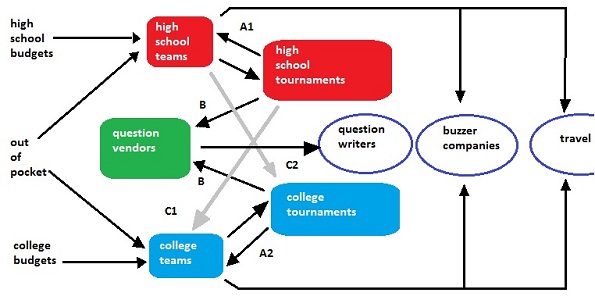Inputs
- Personal finances
The number one source of funds when a club is just starting out and hasn't acquired formal funding from a college. (Frequently, student groups need to go through an official recognition process before getting money. Equally frequently, host schools will let you delay payment until you don't have to pay out of pocket, but they can't always do so.) - Hosting tournaments (high school)
All this money ultimately comes from high schools that do not host tournaments and those school districts/ private school funds. High schools that do host tournaments effectively have their registration fees paid for by... high schools that don't host tournaments. - Mysterious collegiate funding sources
At some schools, clubs like quizbowl get budgets. At others, they have to make individual grant requests for tournaments. It's the rare school that gets $0 from the administration; almost every student group will receive some support. At the very least, it'll receive the support of being able to reserve rooms: turn that power into money by hosting tournaments! - Hosting tournaments (college)
Treated more completely below. A typical tournament--discounting mirror fees and packet discounts; we'll assume that this is a housewrite that the collegiate team in question wrote--will make about $95/team, because attending teams will definitely need to bring buzzers and most likely one or two will need to bring staffers. For Host X, this money, ultimately, really comes from Guests A through J's points one and two; there is a net flow of money from collegiate funds at "attends more than it hosts" schools and from the high schools that attend tournaments hosted at colleges... to collegiate host schools.
- Hosting tournaments (all kinds)
Many colleges charge a fee for room reservations. Inevitably, attending teams will not provide enough buzzer systems to cover everyone, and the host will have to provide at least one--this is, thankfully, a more or less one-time purchase with some repair costs along the way. Providing lunch and sometimes breakfast for staffers is a good way to ensure that you have enough staffers. If you didn't write the tournament yourself, you have to get the questions from somewhere--either factor that into what you net per team in "inputs," or consider it separately here. - Attending tournaments (registration fees)
Registration fees are on average higher than for high school tournaments. I'm not sure exactly why this is; it's likely a combination of factors. For one, there used to be far fewer collegiate tournaments, and so supply used to be a bit shorter. For another, since there are fewer collegiate teams, the only way for hosting a collegiate, rather than a high school, tournament is the right decision on a given weekend is if the entrance fee is higher.
The biggest reason may be that the host school is more often involved in the production of the event's questions and would like to be paid for its effort--while that's a lot less common for high school tournaments, the vast majority of which, historically, have been produced by question vendors. (Note that, accounting for the typical $30 mirror fee, collegiate tournaments hosted by someone other than the question source generally net around $70 a team, which isn't too difficult for typical, non-California high school prices.)
If anyone has a better historical explanation for why college registration fees are higher, I'd love to hear it. I'm almost certain that it has to do with the high school game and how much income the collegiate circuit gets, on net, from the high school circuit. In the status quo, entrance fees and staffers for teams that do host tournament(s) could be replaced by IOUs, redeemed when the host school brings a team and a staffer to the attending school's tournament. If every team in a circuit had one home tournament, this would work fine; there's a net flow of money from teams that can't host tournaments to the socialized mass of "teams that do," though. To whatever extent that the "teams that can't host" get funding from non-tournament sources, that's fine and dandy, but they have a strict upper limit that more active programs don't have on the number of tournaments that they can attend. When entrance fees go up, they can attend fewer tournaments, and since they're not selling their own tournaments, they can't respond by increasing their own entrance fees. On balance, this is bad for the long-term health of quizbowl; it prevents quizbowl from spreading as strongly to a variety of teams--so it's harder to find tournament hosts in the future, income in the future is lower, and if one circuit team goes inactive for a year, that's a larger portion of Frequent Host University's income down the tubes. So we want to keep entrance fees low for our own interest. I'd like to see someone with a better historical knowledge of what entrance fees used to be to contribute how low is too low--and whether or not it actually does have to do with some interaction with the high school game. - Attending tournaments (transportation)
The single biggest financial difference between high school and college quizbowl is that the average distance traveled to go to a tournament is higher. (This is because there are fewer collegiate teams. Since a tournament only makes a decent profit if it attracts more than some cutoff number of teams, this means that a tournament is only profitable if it is some cutoff distance away from the nearest competing tournament on the same date (and sometimes in the same range of dates, as many, if not most, programs lack the money to attend every tournament on the calendar).) The average distance being higher doesn't just mean that the cost of gas is 100 miles worth instead of 20; it also results in hotel rooms and, in extreme cases (or in areas where having a car at college is uncommon or impossible for undergraduates, like the northeast), plane fare.
